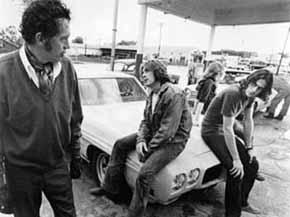Sole Criterion: Two-Lane Blacktop
By Brett Ballard-Beach
March 1, 2012
About a half-hour into the film, and just before the key element of the narrative - a cross-country race from New Mexico to Washington, D.C. between a 1955 Chevrolet 150 and a 1970 Pontiac GTO - is introduced. Characters known only as the Driver (James Taylor) and The Girl (Laurie Bird) have retreated to a nearby meadow alongside a filling station, and are sitting on a fence post. She is a hitchhiker who has wandered into the lives of The Driver and his racing partner The Mechanic (Dennis Wilson) and taken up residence in their backseat. It’s one of the few meaningful (attempts at) conversations that occasionally punctuate the film and its awkwardness belies the fact that the men can only express themselves talking about the cars they drive and the races just behind them and just ahead of them.
The girl (little more than a teenager) seems torn between looking for a sympathetic and resigned to hearing herself talk for talking’s sake. The scene unfolds in a medium-close shot. It lasts about two minutes with no edits. It feels like one of the longest scenes without a cut in the film. They could be any young couple with an interest in one another and an inability to express it. He makes stumbling small talk about the cicadas (which we can hear dominate on the soundtrack) punctuated with a vulgarity. The air is immediately deflated. Shortly thereafter, he lopes off mumbling behind him for her “not to get a splinter in your ass” while she counters with a brusque “You bore me” that cuts this thought off.
This can be considered against the scene about a half hour later where he attempts to teach her how to drive a stick, a failed experiment that ends with them in an embrace that possibly leads to sex, which we are to infer has already happened earlier in the film between her and The Mechanic. (The screenplay contains a lot more overt physicality and sexuality, almost all of which is sublimated, kept off-camera, or missing from the film).
So what is it that puzzles me about the first scene? I find it upsetting, an emotion that I experience at almost no other point during my viewing. (Boredom, joy, sorrow, and angst are also noticeable in their absence.) I had seen the film once before, shortly after it was officially released on DVD in the late ‘90s, and I carried away very little emotional tenor. Upon a second viewing, I began to understand why.
This scene, as well as the other one, is specifically about missed connections, a theme brought to the surface here but simply part of the structure of the film elsewhere. Both dialogues seem too overly symbolic in the lines (in a film where your characters have no names, you already have symbolism and then some) and it tips to the point of evoking what could be unintended laughter, which would also be the only moments in the movie where the tone falters in such a way. The awkwardness of the characters coupled with the performances by first-time actors Taylor and Bird - who were reportedly only given the pages of the script relevant to each day’s shooting - intermingle and as such it becomes impossible, when Taylor appears to flub a line during the scene in the meadow, if it was his “error” or the character’s. I am sensitive to this awkwardness more so I think than at any other point in the film, and yet here, as elsewhere, it never pushes over into discomfort.
Continued:
1
2
3
4
|
|
|
|




